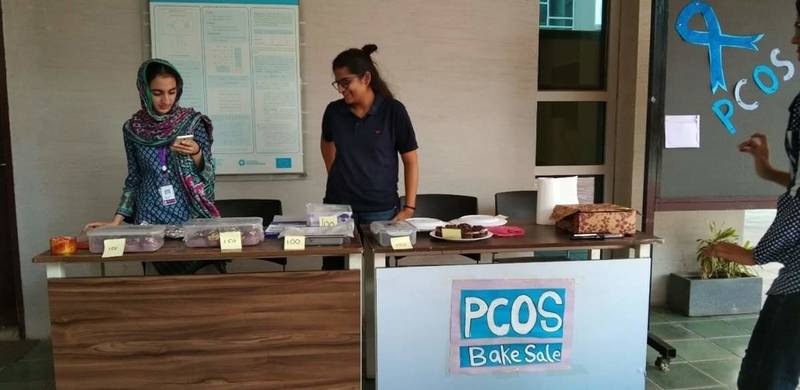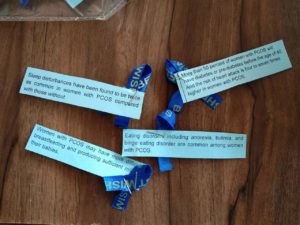
Saira* was around 17-years-old when she found out that she had Polycystic Ovary Syndrome (PCOS). The year was 2007 and there was very limited discussion around a topic which even today is not openly talked about, because the hormonal disorder is a condition related to the female anatomy, and things associated with the female anatomy are usually deemed as taboo in our society.
But thankfully, times are slowly changing for the better now, and there are young people who are realising the importance of raising awareness. Last week, Habib Feminist Collective at Habib University held a bake sale to talk about PCOS. The aim of the event was to raise funds and stress on the importance of breaking taboos around it.
Rida Khan, the press secretary of Habib Feminist Collective (HFem), said that they decided to organise this event because there was hardly any recognition of PCOS in the society, even though a lot of women went through it.
“There is no support system for women who have to go through unbearable pain whenever they're on their period and that is why we are using the money raised to help HER Pakistan, and create a support system for women and girls with PCOS,” she added.
Rida said that the cause was important to her personally because someone close to her had PCOS. She said, “Since I was a small girl, I saw her phase out and go through excruciating pain on the first day of her period. Even today, she usually has to skip work on the first day, which brings us to the issue that there are no paid leaves for women who have PCOS or related diseases.”
Many women have to shift their lifestyle because while there are ways to live with PCOS by taking some concrete steps, they may not always be as easy as they appear to be. Speaking about her case, Saira, who is now 30, said that she hadn’t been consistent with the treatment and efforts to manage PCOS.
“When I initially found out, I had noticed that I was gaining weight very drastically and my period cycle was becoming increasingly irregular to the extent that in one year I had periods four times only. Initially my doctor had prescribed Glucophage, however, after consuming it for a month and experiencing depression that I had never experienced before, I decided to quit taking it,” Saira said.
She added that she took homeopathic treatment on and off and experienced temporary results but could not sustain it. “I also joined the gym from time to time but could not sustain a physically active lifestyle,” she shared.
However last year, she consulted an endocrinologist and discussed her situation with her.
“I also have a fear of swallowing and chewing tablets, which was an additional put-off. After hearing my situation, she asked me to complete a course of four months and come for follow-ups. She asked me to make only one change; 30 minutes of daily walk. I started doing the 30-minutes brisk walking and did so at least three days a week, sometimes four or five, for a period of about six months. For the first time in my life, since my puberty, I started having periods every month, which was very new and unusual for me,” she added.
But that said, she does feel that the stigma attached to PCOS is very real.
“First and foremost, people assume that a woman who has PCOS would be infertile so one has to be conscious about the audience if discussing this problem. Also, fat shaming is normalised and people don't realise how hard it is to lose weight with these conditions. Fortunately for me, I didn't experience any other symptoms like hair growth or acne, but weight has remained a big concern,” she said.
Saira stressed that it was extremely necessary to talk about PCOS because she realised that so many women around her were going through a problem that could be managed.

The students of HFem donated the Bake Sale funds to HER Pakistan, an organisation working on menstrual health of women, especially those who belonged to impoverished communities.
Sana Lokhandwala, who is the founding member of Her Pakistan, said there shouldn’t be a question about why there should be a discussion on PCOS in the first place.
“We discuss everything about a woman's body as long as it provides pleasure to the opposite gender. It's such a taboo to talk about menstruation or PCOS or any other female health issues. This silence leads to shame and irreversible healthcare concerns,” she pointed out.
“Women are never encouraged to see a doctor if they are feeling something unusual. And even our doctors are not aware of these conditions. They simply dismiss a girl's pain saying, "Yeh to hota hai. Itna bhi bardasht nahi hai? Bache kaise paida krogi?”
“With this kind of healthcare system, how do you expect women and girls to open up about their concerns?” she asked.
 Stressing about the importance of speaking up, Sana said that raising awareness is the first step to destigmatise women’s health. She mentioned that the digital safe space ‘Oh My Period!’ helps women share their PCOS journeys as well.
Stressing about the importance of speaking up, Sana said that raising awareness is the first step to destigmatise women’s health. She mentioned that the digital safe space ‘Oh My Period!’ helps women share their PCOS journeys as well.
She said, “Women from all over the world reach us through our DMs on Instagram to say thank you for posting about PCOS and to request for more. This is what we need to do more. We need to tell them that we care and we should genuinely do because PCOS is as real and challenging as any other health condition.”
Looking after the receipts at the sale, Tasbiha Asim of HFem said that someone very close to her was about to go through a surgery of uterus removal because of PCOS, which is why she felt that hushing up the topic was not the answer to the problems faced by hundreds and thousands of women.
Rida believes that awareness should not be limited to women rather men and boys must also be sensitized about this so they may understand about the existence of such conditions. She opined that for too long women’s health issues had been swept under the carpet just because women were thought to be able to bear all kinds of pain.
Many women are highly skeptical when it comes to speaking about PCOS because of its affiliation with infertility, a condition which directly affects their present or future marital plans owing to the compulsion of child-bearing for women in society.
But thankfully, times are slowly changing for the better now, and there are young people who are realising the importance of raising awareness. Last week, Habib Feminist Collective at Habib University held a bake sale to talk about PCOS. The aim of the event was to raise funds and stress on the importance of breaking taboos around it.
Rida Khan, the press secretary of Habib Feminist Collective (HFem), said that they decided to organise this event because there was hardly any recognition of PCOS in the society, even though a lot of women went through it.
“There is no support system for women who have to go through unbearable pain whenever they're on their period and that is why we are using the money raised to help HER Pakistan, and create a support system for women and girls with PCOS,” she added.
Rida said that the cause was important to her personally because someone close to her had PCOS. She said, “Since I was a small girl, I saw her phase out and go through excruciating pain on the first day of her period. Even today, she usually has to skip work on the first day, which brings us to the issue that there are no paid leaves for women who have PCOS or related diseases.”
She further added that women who get painful periods were made fun of because men in our society weren’t conditioned to realize the pain women could go through due to their period cramps.
Many women have to shift their lifestyle because while there are ways to live with PCOS by taking some concrete steps, they may not always be as easy as they appear to be. Speaking about her case, Saira, who is now 30, said that she hadn’t been consistent with the treatment and efforts to manage PCOS.
“When I initially found out, I had noticed that I was gaining weight very drastically and my period cycle was becoming increasingly irregular to the extent that in one year I had periods four times only. Initially my doctor had prescribed Glucophage, however, after consuming it for a month and experiencing depression that I had never experienced before, I decided to quit taking it,” Saira said.
She added that she took homeopathic treatment on and off and experienced temporary results but could not sustain it. “I also joined the gym from time to time but could not sustain a physically active lifestyle,” she shared.
However last year, she consulted an endocrinologist and discussed her situation with her.
“I also have a fear of swallowing and chewing tablets, which was an additional put-off. After hearing my situation, she asked me to complete a course of four months and come for follow-ups. She asked me to make only one change; 30 minutes of daily walk. I started doing the 30-minutes brisk walking and did so at least three days a week, sometimes four or five, for a period of about six months. For the first time in my life, since my puberty, I started having periods every month, which was very new and unusual for me,” she added.
Saira further shared that her weight dropped from 89 kg to 81-82 kg, and she felt less bloated. “My legs wouldn't get numb so frequently when sitting in a certain position. I started feeling lighter and more flexible,” Saira said adding that the physical activity helped her with stress too.
But that said, she does feel that the stigma attached to PCOS is very real.
“First and foremost, people assume that a woman who has PCOS would be infertile so one has to be conscious about the audience if discussing this problem. Also, fat shaming is normalised and people don't realise how hard it is to lose weight with these conditions. Fortunately for me, I didn't experience any other symptoms like hair growth or acne, but weight has remained a big concern,” she said.
Saira stressed that it was extremely necessary to talk about PCOS because she realised that so many women around her were going through a problem that could be managed.

The students of HFem donated the Bake Sale funds to HER Pakistan, an organisation working on menstrual health of women, especially those who belonged to impoverished communities.
Sana Lokhandwala, who is the founding member of Her Pakistan, said there shouldn’t be a question about why there should be a discussion on PCOS in the first place.
“We discuss everything about a woman's body as long as it provides pleasure to the opposite gender. It's such a taboo to talk about menstruation or PCOS or any other female health issues. This silence leads to shame and irreversible healthcare concerns,” she pointed out.
Sana said that women in general and especially in South Asia were not comfortable with the idea of exploring their bodies or reading about it because the concept just did not exist.
“Women are never encouraged to see a doctor if they are feeling something unusual. And even our doctors are not aware of these conditions. They simply dismiss a girl's pain saying, "Yeh to hota hai. Itna bhi bardasht nahi hai? Bache kaise paida krogi?”
“With this kind of healthcare system, how do you expect women and girls to open up about their concerns?” she asked.
 Stressing about the importance of speaking up, Sana said that raising awareness is the first step to destigmatise women’s health. She mentioned that the digital safe space ‘Oh My Period!’ helps women share their PCOS journeys as well.
Stressing about the importance of speaking up, Sana said that raising awareness is the first step to destigmatise women’s health. She mentioned that the digital safe space ‘Oh My Period!’ helps women share their PCOS journeys as well.She said, “Women from all over the world reach us through our DMs on Instagram to say thank you for posting about PCOS and to request for more. This is what we need to do more. We need to tell them that we care and we should genuinely do because PCOS is as real and challenging as any other health condition.”
Looking after the receipts at the sale, Tasbiha Asim of HFem said that someone very close to her was about to go through a surgery of uterus removal because of PCOS, which is why she felt that hushing up the topic was not the answer to the problems faced by hundreds and thousands of women.
“It is high time that we all act up on it because PCOS is also caused by the kind of food we eat, and it has been said numerous times that the feed given to chickens so they may grow rapidly, is one of the causes as well,” she said.
Rida believes that awareness should not be limited to women rather men and boys must also be sensitized about this so they may understand about the existence of such conditions. She opined that for too long women’s health issues had been swept under the carpet just because women were thought to be able to bear all kinds of pain.
